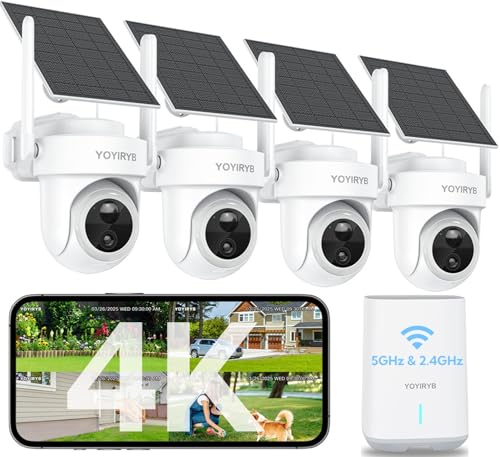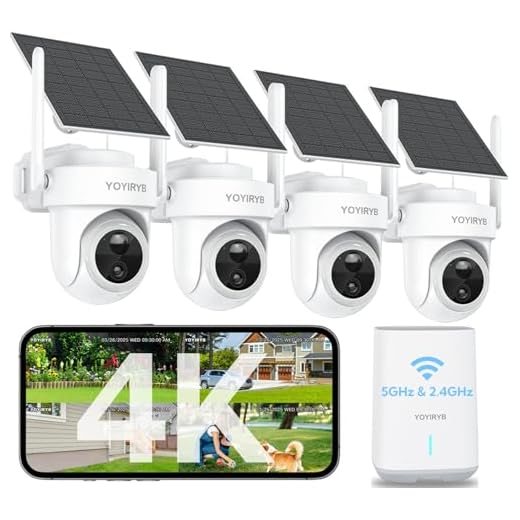


Security cameras play a crucial role in protecting businesses from theft, vandalism, and other security threats. However, many businesses still rely on outdated analog cameras or lower resolution digital cameras, rather than investing in higher resolution options such as 1080 or 4k cameras.
One of the main reasons why businesses may not have upgraded to 1080 or 4k security cameras is cost. Higher resolution cameras tend to be more expensive upfront, and businesses may be hesitant to invest in new technology when their current cameras are still functional.
Another factor to consider is storage and bandwidth requirements. Higher resolution cameras produce larger file sizes, which can require more storage space and bandwidth for live viewing and recording. Some businesses may not have the infrastructure in place to support the increased demands of 1080 or 4k cameras.
Reasons for Not Using 1080 or 4k Security Cameras in Business
While 1080 and 4k security cameras offer high-resolution video quality, there are several reasons why businesses may choose not to use them:
| 1. | Cost: | 1080 and 4k security cameras can be expensive to purchase and install, which may not fit into the budget of all businesses. |
| 2. | Storage: | High-resolution video requires more storage space, leading to increased costs for storage solutions. |
| 3. | Bandwidth: | Higher resolution video footage consumes more bandwidth, potentially slowing down network performance. |
| 4. | Privacy Concerns: | Higher resolution video may capture more details, raising privacy concerns among employees and customers. |
| 5. | Compatibility: | Older systems and devices may not support 1080 or 4k resolution, creating compatibility issues. |
Cost-Efficiency Concerns in Business Environment
When it comes to choosing security cameras for business use, cost-efficiency is a key factor that cannot be overlooked. While 1080p and 4k cameras offer high-resolution video quality, they also come with a hefty price tag. Many businesses, especially small to medium-sized enterprises, may find it challenging to justify the cost of investing in these advanced cameras.
The Importance of Budget Allocation
Businesses often have limited budgets allocated for security measures, and they need to prioritize their spending to ensure overall operational efficiency. Investing in high-resolution cameras may mean compromising on other essential security components or business needs.
Additionally, the maintenance and storage requirements of 1080p and 4k cameras can add to the overall cost of ownership. Businesses need to consider not just the initial purchase price but also the long-term expenses associated with these advanced cameras.
While high-resolution cameras offer superior image quality and clarity, businesses need to weigh the benefits against the cost implications. In many cases, opting for lower-resolution cameras that meet the basic security requirements may be a more cost-effective solution for businesses.
Adequacy of Lower Resolution Cameras for Security Needs
While 1080p and 4K security cameras offer high-resolution video quality, lower resolution cameras can still be adequate for many security needs. Here are some reasons why businesses may opt for lower resolution cameras:
Cost-Effective Solution
Lower resolution cameras are generally more affordable than their higher resolution counterparts, making them a cost-effective option for businesses looking to implement a security system on a budget.
Storage and Bandwidth Considerations
Higher resolution cameras produce larger video files, requiring more storage space and bandwidth for transmission. Lower resolution cameras can help businesses save on storage costs and reduce the strain on their network infrastructure.
| Resolution | Advantages |
|---|---|
| Lower Resolution | Cost-effective, reduced storage and bandwidth requirements |
| Higher Resolution | Enhanced video quality, better detail and clarity |
Ultimately, the choice between lower and higher resolution cameras depends on the specific security needs and budget constraints of the business. Lower resolution cameras can still provide adequate surveillance coverage and help businesses enhance their security measures.
Compatibility with Existing Security Systems
One of the main reasons why businesses may not have 1080p or 4K security cameras is the compatibility issue with their existing security systems. Upgrading to higher resolution cameras may require additional investment in new monitoring equipment, storage solutions, and network infrastructure.
Businesses with older analog CCTV systems may find it challenging to integrate high-definition IP cameras into their current setup. This could result in increased costs and complexity during the transition process.
However, as technology continues to advance, more affordable and user-friendly solutions are becoming available, making it easier for businesses to upgrade their security cameras to higher resolutions without major disruptions to their existing systems.
Storage and Bandwidth Limitations with High-Resolution Footage
One of the main reasons why businesses may not opt for 1080p or 4K security cameras is the issue of storage and bandwidth limitations. High-resolution footage requires significantly more storage space compared to lower resolution footage. This means that businesses would need to invest in larger storage solutions to accommodate the increased file sizes of high-resolution videos.
Additionally, transmitting high-resolution footage over a network can consume a substantial amount of bandwidth. This can lead to slower network speeds and potential disruptions in other critical operations that rely on the network infrastructure.
For businesses with limited resources or those looking to balance the need for high-quality footage with practical considerations, opting for lower resolution cameras may be a more cost-effective and efficient solution.
Privacy and Legal Considerations in Business Surveillance
When it comes to implementing surveillance systems in a business environment, privacy and legal considerations play a crucial role. Businesses must navigate a fine line between maintaining security and respecting the privacy rights of employees, customers, and visitors.
Privacy Concerns
One of the primary concerns with surveillance cameras in a business setting is the potential invasion of privacy. Employees may feel uncomfortable knowing they are being constantly monitored, leading to a decrease in morale and productivity. Customers and visitors may also be wary of businesses that have extensive surveillance systems in place.
Legal Regulations
Business owners must also be aware of the legal implications of using surveillance cameras. Laws vary by jurisdiction, but generally, businesses are required to inform individuals when they are being recorded. Failure to comply with these regulations can result in legal consequences, including fines and lawsuits.
| Privacy Considerations | Legal Regulations |
| Employees may feel uncomfortable. | Businesses must inform individuals of recording. |
| Customers and visitors may be wary. | Non-compliance can lead to fines and lawsuits. |
Maintenance and Technical Support for High-Resolution Cameras
One of the reasons why businesses may not opt for 1080p or 4K security cameras is the maintenance and technical support required for these high-resolution devices.
High-resolution cameras typically have more complex technical requirements compared to lower-resolution cameras. This means that businesses need to invest in regular maintenance to ensure that the cameras are functioning optimally.
Additionally, technical support for high-resolution cameras may be more specialized and costly. Businesses may need to hire technicians with specific expertise in handling 1080p or 4K cameras, which can add to the overall cost of ownership.
Without proper maintenance and technical support, high-resolution cameras may not provide the desired level of security and surveillance, leading some businesses to opt for lower-resolution alternatives that are easier to maintain and support.







